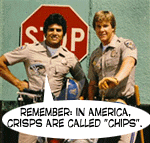Generally
speaking, being British (and, more specifically,
English) is rubbish. Fact is, everyone hates us. Not a
great surprise give that, at one time or another, the
British Empire has pissed in the dinner of every nation
on the planet, be it America, Australia, India, Africa,
Ireland… well, we could go on, but bottom line is;
we’re the most hated race on Earth. With the exception
of our shining ambassadors of British culture such as
Geri Halliwell, Mr Bean and Benny Hill, there can be few
foreigners who wouldn’t consider the world a better
place without us. But, frankly, the joke’s on them.
Britain has something that they’ll never have.
Something that sets us apart from Johnny Foreigner.
It’s something that he’ll never understand, nor get
his hands on: the potato crisp.
 Oh
sure, you get your so-called “chips” abroad, but in
America you’re lucky to find any flavour other than
“Salted” or “BBQ” or Doritos, while on the
continent it’s usually just “Salted” or
“Paprika”. The British crisp comes in every flavour
imaginable, from mustard to chilli to pickled onion to
hedgehog, to every shape, from round, to square, to
rippled, to monster shaped. The diversity of the British
crisp is, frankly, “crisp-tonishing”.
Oh
sure, you get your so-called “chips” abroad, but in
America you’re lucky to find any flavour other than
“Salted” or “BBQ” or Doritos, while on the
continent it’s usually just “Salted” or
“Paprika”. The British crisp comes in every flavour
imaginable, from mustard to chilli to pickled onion to
hedgehog, to every shape, from round, to square, to
rippled, to monster shaped. The diversity of the British
crisp is, frankly, “crisp-tonishing”.
Be
that as it may, the crisp was invented in 1853 by an
American Indian chef, George Crum (not a made up name,
sadly – though it’s a miracle that crisps ended up
not being called “crums”), who worked at a hotel in
New York State. Crum was catering for the culinary
demands of a difficult diner, railway magnate Cornelius
Vanderbilt. The train dude was proving a difficult
customer, complaining repeatedly that his French fries
were cut too thick. By way of a sort of joke, the
exasperated Crum chopped Vanderbilt’s potatoes into
wafer-thin slices, and fried them. But what had been
intended as a cuss proved too tasty to resist, and
Vanderbilt gave them the thumbs up. Soon, word of this
new culinary sensation had begun to spread. Albeit
slowly.
In
1920 Londoner Frank Smith caught wind of this new way of
eating potatoes – which had been introduced into the
UK seven years earlier, by a man named “Carter”,
who’d encountered them in France – and set up a
business in his garage manufacturing them. His wife
peeled, sliced and fried, while Smith would package in
greaseproof bag, before setting off in his cart to sell
the snack around London. Within a year Smiths Crisps was
forced to move to larger premises, and employ additional
staff. To cater for customers with a savoury tongue,
Smith gave them the option of adding salt to their
crisps, including a small twist of blue paper with his
snacks. To cater for customers with an unsavoury tongue,
Smith toyed with including a twist of dried and shredded
dog foreskin, dipped in aspic, but ultimately rejected
the plan…
North
of London, competition came in the shape of Walker’s
Crisps. Henry Walker,  a
successful pork butcher, faced bankruptcy with the
introduction of wartime rationing. Short of selling dead
cats and rats and insects, Walker’s was forced to
change track, and introduce other, additional streams of
revenue. Then managing director R.E. Gerrard considered
moving into ice cream (no, no - not to live in, but to
sell), though he had concerns over hygiene, namely that
meat and dairy products do not mix well within the same
factory premises (though Walls would probably disagree;
“Would you like a sausage in that cornet, son?”).
And so it was to the un-rationed potato that the company
turned, and to great success; when meat was de-rationed
in 1954, Walkers kept its focus on crisps.
a
successful pork butcher, faced bankruptcy with the
introduction of wartime rationing. Short of selling dead
cats and rats and insects, Walker’s was forced to
change track, and introduce other, additional streams of
revenue. Then managing director R.E. Gerrard considered
moving into ice cream (no, no - not to live in, but to
sell), though he had concerns over hygiene, namely that
meat and dairy products do not mix well within the same
factory premises (though Walls would probably disagree;
“Would you like a sausage in that cornet, son?”).
And so it was to the un-rationed potato that the company
turned, and to great success; when meat was de-rationed
in 1954, Walkers kept its focus on crisps.
In
1947, Baker William Alexander had had a similar plan to
capitalise on the crisp craze, and founded Golden
Wonder. The company was the first to introduce “Ready
Salted” crisps, that didn’t require the customer to
add his own flavour. Later, Golden Wonder pioneered
other flavours, starting in 1962 with Cheese And Onion,
and further diversifying a decade aftwards with the
tampon-shaped cheesy Wotsit, the most orange of all the
snacks.
Nowadays,
Golden Wonder is relatively diminished concern from the
high point of the 70s and 80s, when it ruled the UK
snack scene alongside Smiths. And Smiths itself is all
but gone, bought out by the all-conquering Walkers (or,
as Walkers would have it, “joined forces” with
them), which is now a subsidiary of the Pepsico
behemoth. Walkers’ improbable success has been built
upon the back of aggressive brand purchasing, and
introducing new flavours based upon soccer stars, such
as the Michael Owen-endorsed “Cheese & Owen”,
and self-explanatory “Assault And VinnieJones”.
But
the fact remains that the British love their crisps.
Crisps make up more than 60% of the UK savoury snack
market. 8,500 MILLION packets are sold in the UK every
year. It’s because of the variety that no crisp-eating
experience is alike.  Whether
your preference is for the “death-breath” specials,
such as the Pickled Onion Monster Munch (like Wotsits,
strictly speaking more a “corn snack” than a crisp),
Walkers Worcester Sauce, or Sour Cream And Onion
Pringles, or the more gourmet crisp, such as KP’s
Brannigans brand, which features Roast Beef And Mustard,
Ham And Pickle, and the hard-to-find Minted Lamb, and
Chicken And Stuffing flavours, there’s a crisp for
every pallette.
Whether
your preference is for the “death-breath” specials,
such as the Pickled Onion Monster Munch (like Wotsits,
strictly speaking more a “corn snack” than a crisp),
Walkers Worcester Sauce, or Sour Cream And Onion
Pringles, or the more gourmet crisp, such as KP’s
Brannigans brand, which features Roast Beef And Mustard,
Ham And Pickle, and the hard-to-find Minted Lamb, and
Chicken And Stuffing flavours, there’s a crisp for
every pallette.
Of
course, not every crisp concept is a success. We lament
the passing of Beefy Monster Munch, Smiths’ Sky-Divers
– a corn snack shaped like a little guy with a giant,
swollen cranium – and Smiths’
“shouldn’t-work-but-it-does” Bovril flavour.
However, we’re more than happy to see the passing of a
particular brand of short-lived, fizzy fruit-flavour
crisps (what WERE they thinking?), as well as
“Puffs”, and Golden Wonder’s eye-watering tomato
sauce flavour.
For
the record, Bubblegun’s all-time favourite flavours
are Golden Wonder’s Ready Salted, and Sausage And
Tomato, the aforementioned Brannigan’s Minted Lamb,
Walker’s Beef And Onion, and Tesco’s own in-house
Marmite flavour. We’re also missing the long-gone
Smiths, and their benchmark Cheese And Onion and Salt
And Vinegar, and their abortive attempt to introduce
flavoured Salt And Shake crisps. Even so, Smith’s
standard Ready Salted always tasted like someone had
pulled their trousers down, and sat in the vat on a hot
summer’s afternoon.
